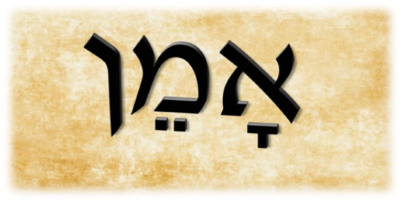In this article we are going to look at the different Hebrew words that are translated as "trust". While the word "trust" appears 134 times in the King James Version of the Bible. There are several different Hebrew words behind the English. The English word "trust" is an abstract (cannot be sensed by the five senses), but Hebrew is a concrete oriented language where each word is associated with something that can be sensed by one or more of the five senses. Each of these Hebrew words has their own nuance of meaning that can aid in interpreting the passages they are found in.
חסה (chasah strong's #2620)
The LORD [is] my rock, and my fortress, and my deliverer; my God, my strength, in whom I will trust. (Ps 18:2
This word has the meaning of "to lean on someone or something". If you are hiking with a group of your friends and you sprain your ankle, you are going to lean on one of your companions to help you out of the wilderness. God is the one that we lean on when things get tough. We can also lean on our friends and family for support as well.
בטח (betach strong's #982)
In God I will praise his word, in God I have put my trust; I will not fear what flesh can do unto me. (Ps 56:4)
This word has the more concrete meaning of "to cling". A related word, avatiyach (#20) is a melon which clings to the vine. Even though the melon is huge, just as our problems seem to be, the vine is very small. We may not see God but, his is our strength, the one who nourishes us just as the vine nourishes the melon.
יחלל (yachal strong's #3176)
My righteousness [is] near; my salvation is gone forth, and mine arms shall judge the people; the isles shall wait upon me, and on mine arm shall they trust. (Isa 51:5)
This word is usually translated as hope but it does not mean to wonder if something will happen and "hope" it does but, to "know" that something will happen in the future. We do not hope that God will protect us; we "know" he will. In the above passage the concrete image of holding onto God's arm for support can be seen but, the word arm (zeroah) is a Hebraic euphemism (using one word to mean something else) for "strength". This passage is saying that the people will know that God's strength will save them.
אמן (aman strong's #539)
Trust ye not in a friend, put ye not confidence in a guide: keep the doors of thy mouth from her that lieth in thy bosom. (Micah 7:5)
The word aman means to "be firm". When setting up a tent you always choose "firm" soil to drive in your tent pegs so that when the wind blows, the tent pegs will not be pulled out of the ground collapsing your tent (see Is 22:23 where the word aman is translated as "sure" in the KJV). This word is the verb form of the word "amen". When we say "amen", we are literally saying I stand firm on this prayer.

Like what you’re discovering? Continue the journey from Bible reader to translator.
|






